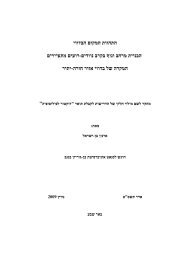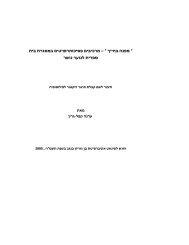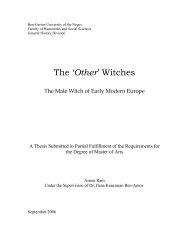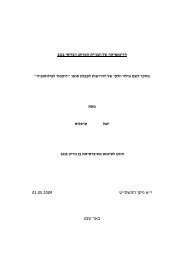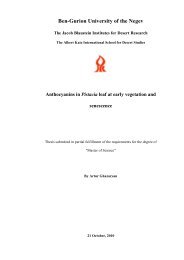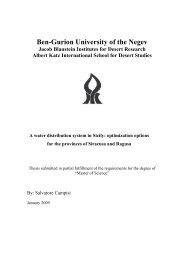רוח חן - אוניברסיטת בן-גוריון בנגב
רוח חן - אוניברסיטת בן-גוריון בנגב
רוח חן - אוניברסיטת בן-גוריון בנגב
Create successful ePaper yourself
Turn your PDF publications into a flip-book with our unique Google optimized e-Paper software.
vi<br />
the main tool with which to instill this knowledge in their students. These<br />
science-teaching approaches and methods, including the use of Rua˙ Óen, did<br />
not vary in the traditional educational system in Karaite communities of Crimea<br />
at least until the second third of the nineteenth century.<br />
Exegesis of Rua˙ Óen began already at the beginning of its reception.<br />
This exegesis was given orally, during the process of teaching and learning<br />
Rua˙ Óen, and resulted in the writings of commentaries. The need for exegesis<br />
and commentaries was felt especially in Ashkenaz and Poland, where there was<br />
no tradition of studying Aristotelian sciences, as developed by the Jews of<br />
Southern France and Italy. These conditions led to the development of a<br />
tradition of reading, copying and composing commentaries on Rua˙ Óen on<br />
Ashkenazi soil, beginning in the middle of the fifteenth century and continuing<br />
for over one hundred and fifty years. I have identified a total of six<br />
commentaries on Rua˙ Óen that were composed by Ashkenazi Jews (one<br />
printed and the rest are preserved in manuscripts).<br />
My study of the commentaries on Rua˙ Óen sheds light on different<br />
aspects relating to its use as a textbook. I thus asked whether the commentaries<br />
widened the scope of philosophical and scientific contents presented in Rua˙<br />
Óen itself. My analysis shows that this was not the case: the commentaries<br />
generally did not provide a broader philosophical and scientific knowledge than<br />
was presented in Rua˙ Óen, especially such that would have involved new<br />
scientific theories. It is noteworthy that the philosophical and scientific scope of<br />
these commentaries did not depend upon the openness or closure to the study of<br />
the "foreign sciences" in the respective cultures.<br />
At the end of this study a comparative discussion is presented, dealing<br />
with Rua˙ Óen's place in the examined Jewish cultures. I suggest that in these<br />
cultures, Rua˙ Óen attained recognition as a canonic text, whose authority as a





